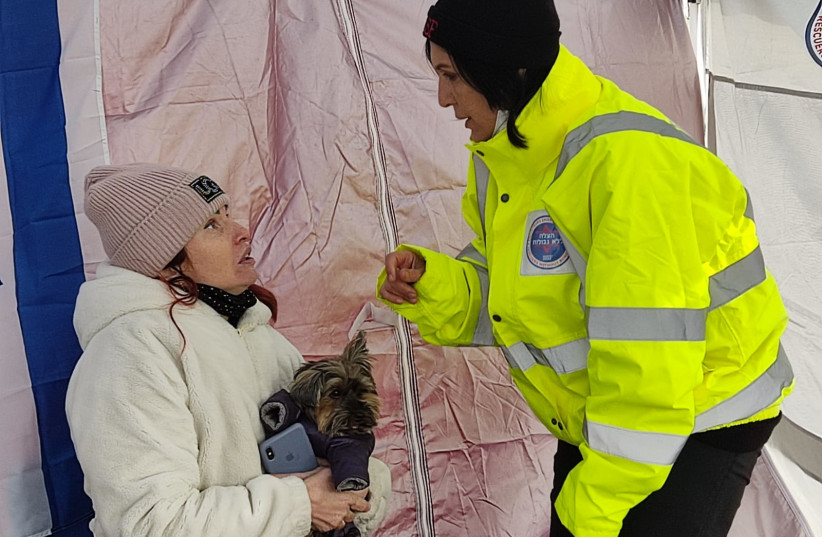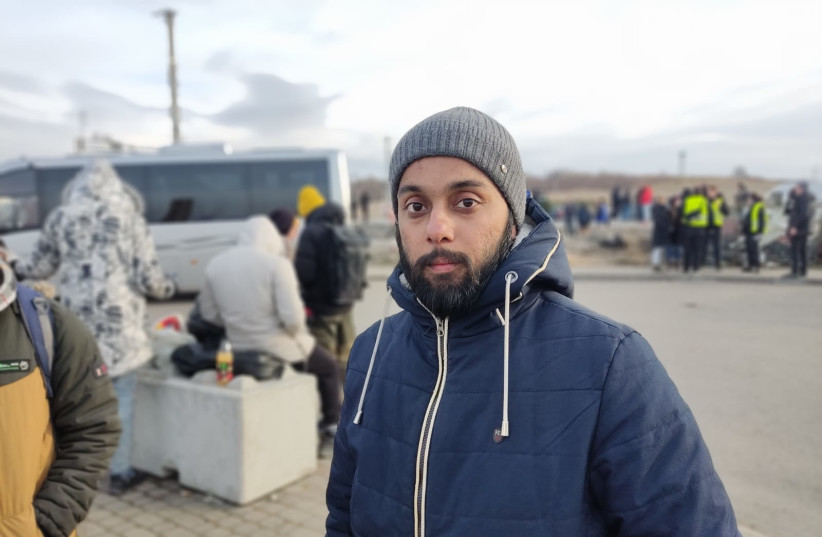MADYKA, Poland – A family with three young girls walks through the Poland-Ukraine border crossing. It is freezing cold, but the chilled wind does not ruin their relief. They are free at last. They carry no suitcases, just a few bags, and the girls are each hugging teddy bears.
The border crossing looks like a large, improvised refugee camp, with the smell of smoke wafting in the air from several groups lighting fires in an effort to warm up.
Buses and vehicles pass through the crossing. Some have reached the border alone with nothing but a suitcase, or even just a small bag. Many of the refugees say they had packed suitcases, but were forced to leave them in Ukraine following Russian assaults and explosions.
The Red Cross was forced to evacuate from the border a few kilometers into Poland. Whoever entered the gaping space was met by the Israeli organization Rescue Without Borders, which brought medical volunteers from Israel and set up a small tent that became an essential lifesaver.
“We have been here for two days, and are constantly treating refugees who come here destitute, many of whom suffer from hypothermia and dehydration,” says Rescue Without Borders chairman Aryeh Levy. “The organization brought 100 thermal blankets, which ran out too quickly.”
Suddenly a woman faints nearby, and rescue members rush over to treat her. Later I discover that she had a heart attack. Israeli volunteers saved her life, but the ambulance that was rushed to the scene is not allowed to leave. There is chaos everywhere, with almost no Polish policemen or soldiers supervising the compound.

Jasren, an Indian student who has been studying in Kyiv for the past year, crosses the border and is shivering from the cold.
“We walked for three days from Lviv until we reached the border crossing to Poland,” he says. “To my delight, people from the neighboring villages came out to us with soups, tea and food to help us get through this journey safely.”
Jasren has no intention of coming back to Ukraine.
“I will return to my home in New Delhi, but cannot stop and think about my friends in Ukraine who have no home to return to – I at least have one,” he said, trembling. “I haven’t slept in a bed for four days. I intend to go to the shelter of the Embassy of India and then will return to India.”
A group of three Israelis living in Poland arrives at the border with a box of kosher sandwiches: small challot with tuna salad. They asked not to be identified.
“We came here not to be famous but to help,” said one, while handing out sandwiches to everyone around. “It’s kosher and halal,” they told Muslim students from Morocco and Lebanon, who also asked to eat something after many days of not living a normal life.

AHARON AHARONCHIK, an Israeli who emigrated from Lithuania, came to the border to cross in the other direction – toward Ukraine.
“I came to help my friends,” Aharonchik says in Hebrew. “My friends, a family of five with an 80-year-old grandmother, want to leave. I told them I’d come to help them. They were 50 kilometers from here, but now they are approaching the border and I will go out with them to accompany them to Poland.”
Afterward he plans to assist the Israel Embassy in finalizing their immigration to Israel.
We escort him to the border, where I asked him: “Are you scared?”
He smiled. “Absolutely not.”
I speak on the phone with Max Kingsborsky, an Israeli-Ukrainian, who fled to a hotel near the border on the Polish side. He is a businessman who has lived in Kyiv in recent years.
“My wife heard explosions and we decided to leave immediately,” he says. “We got in the car and drove with our little baby for three days. I saw a lot of people walking while we were driving. This is a hallucinatory situation.”
Now he is trying to buy military and medical equipment for his friends inside Ukraine.
“Most of the soldiers in Ukraine today are civilians who have never held a weapon in their hands,” he said. “I am now buying medicine, knee pads and vests because there is a great shortage. It is inconceivable – four days ago I was living in Kyiv, and now I’m a refugee. I chose not to be a bystander. If I can somehow help them from here in Poland to win the war, I will do it.”
When asked if he thought the Jews of Ukraine were interested in emigrating to Israel, he said, “A high percentage of the community in Kyiv, which is large and united, will immigrate to Israel and not return to Kyiv at all.”
There were no representatives of the Foreign Ministry on the Polish side of the border while we were there, although they arrived later. Nor were there any representatives of official Jewish organizations such as the Jewish Agency, the Joint Distribution Committee or Nativ. However, a Jewish Agency emissary received a bus on Tuesday filled with 90 Ukrainian Jews who were preparing to immigrate to Israel in the coming days.
The Jewish Agency, in cooperation with the International Fellowship of Christians and Jews, has opened a transit station that houses about 100 people in a hotel near Warsaw Airport, for Ukrainian Jews who will make aliyah. The Jewish Agency also maintains such stations in Moldova, Hungary and Romania.
